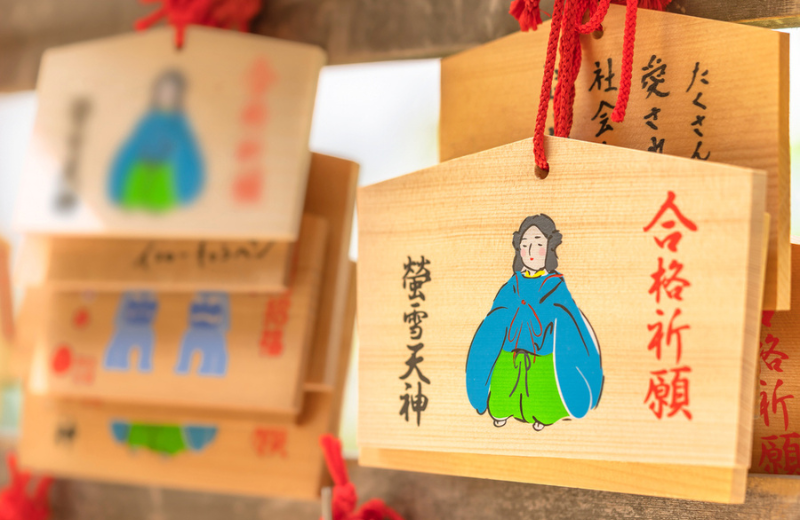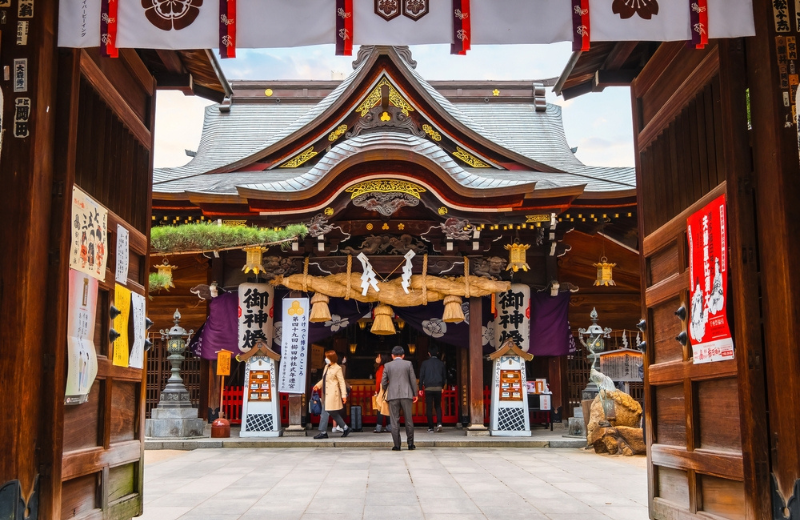Known as a god of learning and scholarship, Tenjin has become one of the most beloved figures in Shinto belief and Japanese culture. His story is a journey of humanity, injustice, and redemption.
Whether you're interested in his myths or looking to understand the traditions that surround him today, this guide provides a clear and engaging overview of his role in Japanese folklore.
Jump to:
- Who Is Tenjin in Japanese Mythology?
- Tenjin’s Myths
- The Role of Tenjin in Japanese Storytelling
- What Powers Did Tenjin Possess?
- Symbols Associated with Tenjin
- Tenjin's Lineage and Connections
- Why Is Tenjin Special?
- Tenjin in Modern Culture
- Tenjin’s Worship and Legacy
- Frequently Asked Questions About Tenjin
- Study Japanese Mythology for £29
Recommended for you!
Best SellersWho Is Tenjin in Japanese Mythology?
Tenjin is the deified form of a historical figure named Sugawara no Michizane, a brilliant scholar, poet, and politician of the Heian period (794–1185). After being wrongfully exiled due to political rivalries, Michizane died in isolation and heartbreak. Not long after his death, Kyoto experienced a series of disasters: lightning strikes, plagues, and the deaths of his political enemies. Many believed Michizane’s angry spirit was the cause.
In response, the imperial court took steps to appease his soul, eventually enshrining him as Tenjin-sama, the kami (spirit or god) of scholarship. He was worshipped as a powerful and wise figure, both feared and deeply respected.
Tenjin’s Myths

While Tenjin’s story is deeply rooted in real events, several myths have emerged over the centuries that reflect his transformation from a wronged man to a beloved deity. These tales blend history with spiritual belief, adding depth to his legacy as a god of learning and justice.
The Haunting of the Capital
After Michizane’s death in exile, a series of calamities struck the imperial court—lightning struck the palace, crops failed, and important officials died unexpectedly. These misfortunes were believed to be caused by his vengeful spirit, prompting the court to enshrine him as Tenjin to restore peace.
The Flying Plum Tree
One of the most cherished myths tells of Michizane’s favourite plum tree in Kyoto. According to legend, the tree missed him so dearly that it uprooted itself and flew all the way to Dazaifu, where he had been exiled, to be by his side.
The Ox and the Final Resting Place
It’s said that after Michizane’s death, his body was being transported for burial when the ox pulling the cart suddenly stopped and refused to move. Interpreting this as a divine sign, the mourners buried him on that very spot, where the Dazaifu Tenmangu Shrine now stands.
The Role of Tenjin in Japanese Storytelling
Unlike Japanese gods of thunder or love, Tenjin’s story is grounded in emotional realism. He’s a reminder that even the wisest and most virtuous can be brought down by politics and envy. His story resonates with those who’ve experienced unfair treatment or who strive to rise through learning and integrity.
He appears in countless poems, artworks, and modern references, offering encouragement to students and scholars, particularly during times of examination and academic pressure.
What Powers Did Tenjin Possess?
While he may not wield a thunderbolt like some deities, Tenjin’s abilities are no less powerful. His divine strength lies in:
- Wisdom and Learning: Tenjin has the power to inspire intelligence, focus, and insight. Students pray to him for mental clarity and success in exams.
- Literary Brilliance: He protects those who write, study literature, or engage in intellectual pursuits.
- Spiritual Protection: As a kami, he watches over his followers and helps maintain balance in justice, especially for those who have been treated unfairly.
Over time, his wrathful past has softened, and he is now seen as a generous guide rather than a punishing force.
Symbols Associated with Tenjin
Several meaningful symbols are associated with Tenjin, each reflecting his character, legacy, and divine role as the god of learning. These symbols are commonly seen at his shrines and during festivals, serving as reminders of his wisdom and story.
- Plum Blossoms (Ume): Representing determination, loyalty, and refined beauty. These are often planted near Tenjin shrines and bloom early, symbolising hope and renewal.
- Calligraphy Brushes: Signifying scholarship and poetic skill, these tools highlight Tenjin’s intellect and his contributions to literature.
- Oxen: Frequently depicted in statues near shrines, the ox is linked to the legend of Michizane’s burial site and symbolises guidance and humility.
- Scrolls and Books: Emblems of learning, these are commonly offered to Tenjin during festivals and prayers for academic success.
Tenjin's Lineage and Connections
While many deities in Japanese mythology are tied to divine family trees, Tenjin stands apart due to his human origins. Born into a prestigious family of scholars in 845, Sugawara no Michizane rose through the ranks based on talent, not bloodline.
This human beginning makes him deeply relatable. He was not born a god, but became one through suffering and legacy. His lineage includes ties to aristocratic and academic circles, which only strengthened his identity as a protector of knowledge.
Why Is Tenjin Special?
Among Japan’s many kami, Tenjin holds a unique place. He represents:
- Human Struggle: His tale isn’t of celestial drama, but political betrayal and redemption.
- Transformation: From mortal to divine, from anger to benevolence.
- Hope for Students: Tens of thousands of students pray to Tenjin every year, pinning wishes on ema (wooden plaques) at shrines during exam season.
Tenjin in Modern Culture
Tenjin’s presence in modern Japan is strong, appearing in anime like Noragami and Kamichu! where themes of gods and learning are explored. The term “Tenjin-sama” is still widely used to show reverence, and you’ll often see his image near schools and libraries.
Schoolchildren may carry charms from Tenjin shrines during exams, and he’s even referenced in some pop culture as a symbol of intellect and fairness.
Tenjin also lends his name to locations, such as the Tenjin district in Fukuoka, a lively area that blends tradition with contemporary city life.
Tenjin’s Worship and Legacy

Worship of Tenjin is widespread, with over 12,000 Tenmangu shrines across Japan dedicated to him. These sacred spaces are places where students go to pray, write wishes, and seek academic success.
Perhaps the most famous celebration of his legacy is the Tenjin Matsuri in Osaka, one of Japan’s top three festivals. The event is an elaborate celebration featuring a grand procession of boats on the river, fireworks displays, traditional music and costumes, and ceremonial offerings to the god. This joyful festival reflects both Tenjin’s power and his enduring presence in Japanese hearts.
Frequently Asked Questions About Tenjin
Who is Tenjin Sama?
“Tenjin-sama” is a respectful way of referring to the deified Sugawara no Michizane, worshipped as a kami of wisdom and intellect.
What are the facts about Tenjin?
Some interesting facts include:
- He was born in 845, making him over 1,100 years old in historical terms.
- He was an actual poet and statesman before becoming a deity.
- His favourite flower was the plum blossom.
- He is often shown with an ox or surrounded by calligraphy tools.
Who was Tenjin in love with?
Historical records don’t suggest a famous love story tied to Tenjin, as most focus on his scholarly life and political career. However, his deep affection for plum blossoms is often romanticised.
How old is Tenjin?
As Sugawara no Michizane, he lived from 845 to 903. As a deity, his worship began shortly after, making Tenjin over a millennium old in religious tradition.
Recommended for you!
Best SellersStudy Japanese Mythology for £29
Interested in exploring more about ancient Japanese beliefs, traditions, and divine figures like Benzaiten? The Introduction to Japanese History and Culture Diploma Course from Centre of Excellence is the perfect place to start. For a discounted price of £29, you'll learn about he spiritual stories, practices, and philosophies that shaped Japan’s past and continue to influence it today.













